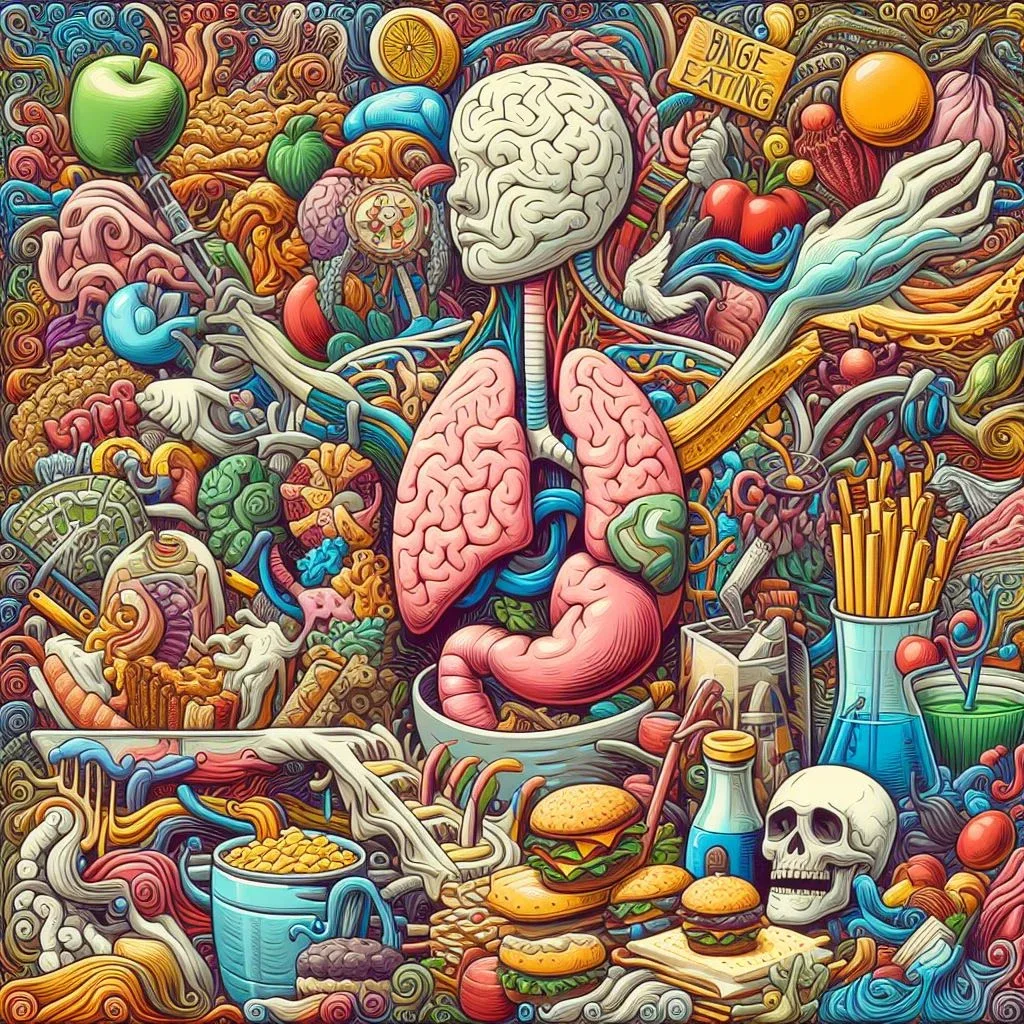A binge eating is an eating disorder characterized by recurrent episodes of excessive food intake, often accompanied by a feeling of lack of control. It is estimated to affect around 2% of the population. To the causes of binge eating They are multifactorial and may include genetic, emotional and environmental factors. Symptoms include eating quickly until feeling uncomfortably full, eating alone out of shame or embarrassment, and feeling ashamed or guilty after binge episodes. The treatment for binge eating involves a multidisciplinary approach, which may include cognitive behavioral therapy, interpersonal therapy, and nutritional counseling. Furthermore, strategies such as conscious eating and the cultivation of self-control based on the principles of stoicism can help people find balance in their diet and overcome binge eating.

Main points of this article:
- Binge eating is a eating disorder which affects around 2% of the population.
- As causes of binge eating involve genetic, emotional and environmental factors.
- Symptoms include excessive food intake, lack of control and feelings of guilt.
- Treatment for binge eating involves cognitive behavioral therapy and nutritional counseling.
- A conscious eating and the principles of stoicism can help control binge eating.
By seeking professional help and adopting effective strategies, it is possible to find balance in your diet and overcome binge eating.
Symptoms and Causes of Binge Eating
Binge eating is a disorder that can present a series of symptoms and have different causes. Recognizing the characteristic signs of binge eating and understanding its origins is essential to seeking appropriate help and treatment. In this section, we will discuss the most common symptoms of binge eating and the possible causes behind this disorder.
Symptoms of Binge Eating
Os symptoms of binge eating They may vary from person to person, but there are some signs that are frequently observed. Among the most common symptoms are the rapid and uncontrolled ingestion of large amounts of food, even when you are not physically hungry. During binge episodes, the person feels a sense of loss of control, being unable to stop eating even when they are already satisfied.

Furthermore, it is common for people who suffer from binge eating to experience intense feelings of guilt and shame after episodes of overeating. These feelings can lead to a vicious cycle, in which binge eating becomes a way of dealing with one's own emotional discomfort, which in turn further increases feelings of guilt and shame.
Binge eating can also have a significant impact on a person's quality of life, interfering with interpersonal relationships, performance at work or studies and physical and mental health in general.
Causes of Binge Eating
As causes of binge eating They are multifactorial and can vary from person to person. Emotional factors such as stress, anxiety, depression and low self-esteem can play an important role in the development of binge eating. Food can become a way of dealing with these emotions, becoming a kind of refuge or solace.
In addition to emotional factors, environmental issues can also contribute to binge eating. The abundant availability of palatable foods and easy access to them can make resisting binge eating more difficult. Social and cultural pressure, which values thinness and restrictive eating patterns, can also create an environment conducive to the emergence of binge eating.
It is important to highlight that binge eating is a complex disorder and that each person may present a unique combination of factors that contribute to its development. Seeking support from specialized professionals is essential to better understand the symptoms and causes of binge eating and begin the treatment and recovery process.

Treatment and Control of Binge Eating
Binge eating is a serious disorder that requires appropriate treatment to help people overcome this difficulty. O binge eating treatment it generally involves a multidisciplinary approach, which combines individual or group therapy with the support of specialized professionals, such as psychologists and nutritionists.
One of the most common therapeutic approaches is cognitive behavioral therapy (CBT). CBT aims to identify and modify dysfunctional thought patterns and behaviors associated with binge eating. During CBT sessions, patients learn to recognize the emotional triggers that trigger binge episodes and develop skills to deal with these emotions in a healthier way.

In addition to cognitive behavioral therapy, other forms of treatment may be recommended, depending on each person's individual needs. Interpersonal therapy is an option that helps identify and resolve emotional issues that may be contributing to binge eating. Nutritional counseling plays an important role, providing guidance on a balanced diet and helping patients develop a healthier relationship with food.
In addition to professional treatment, there are some tips that can help control binge eating. Establishing a regular eating routine and eating at predetermined times can help reduce food impulsiveness. Furthermore, learning to identify the emotions associated with binge episodes and seeking healthy alternatives to deal with these emotions can be fundamental.
For those who are having difficulty dealing with binge eating, it is important to seek professional help. A psychologist or nutritionist specializing in binge eating can offer the necessary support, teach specific techniques and provide emotional support during the recovery process.

Table: Common Approaches to Treating Binge Eating
| Approach | Overview |
|---|---|
| Cognitive behavioral therapy (CBT) | Identification and modification of dysfunctional thought patterns and behaviors. |
| Interpersonal therapy | Identification and resolution of emotional issues related to binge eating. |
| Nutritional advice | Guidance on balanced eating and developing a healthy relationship with food. |
| Support groups | Sharing experiences and emotional support for people facing similar challenges. |
The Role of Stoicism in Controlling Binge Eating
Binge eating is a significant challenge for many people, and finding effective strategies to combat it can be key to promoting a healthy relationship with food. One approach that has shown promise in this regard is the application of the principles of stoicism. Stoicism is an ancient philosophy that emphasizes self-control, acceptance of emotions, and the pursuit of virtue. By incorporating these principles into our approach to eating, we can develop skills and techniques to combat binge eating effectively.
One of the tips to combat binge eating using stoicism is to identify what the true desires and needs are in relation to food. Often, binge eating arises as a response to negative emotions or stressful situations. By practicing self-awareness and reflection, we can distinguish between legitimate physical hunger and the emotional impulse to binge eat. This way, we are able to direct our attention to healthier and more satisfying solutions.
Binge eating is a response to negative emotions or stressful situations. By practicing self-awareness and reflection, we can direct our attention toward healthier, more satisfying solutions.
Another stoicism strategy is the practice of accepting emotions without judgment. Instead of fighting feelings of guilt or shame associated with binge eating, we learn to recognize them as part of the human experience. This allows us to face these emotions in a more positive and constructive way, without turning to food as a form of escape or comfort.
Furthermore, stoicism invites us to cultivate gratitude and resilience in the face of challenges. By developing a mindset of gratitude for healthy meals and foods, we can enjoy food more in a conscious and satisfying way. At the same time, resilience helps us overcome difficulties and relapses, maintaining focus on our goals of controlling binge eating.
Applying the principles of stoicism to controlling binge eating is a complementary and promising approach for those seeking to overcome this challenge. However, it is important to note that each person is unique and may need a personalized treatment plan. Seeking help from a psychologist who specializes in binge eating can provide the support you need to learn specific Stoicism techniques applied to eating and receive emotional support during the recovery process.
| Benefits of Stoicism in Controlling Binge Eating | Tips for Applying Stoicism to Combat Binge Eating |
|---|---|
| Development of self-control | Identify true food desires and needs |
| Acceptance of emotions without judgment | Practice self-awareness and reflection |
| Cultivating gratitude for healthy meals | Cultivate gratitude and resilience |
| Developing resilience in the face of challenges | Seek support from a specialized psychologist |

Conclusion
Binge eating is a serious disorder that affects many people. However, there are effective strategies for treating and controlling binge eating. A conscious eating, which involves paying attention to internal cues of hunger and satiety, is a promising approach to helping people develop a healthier relationship with food.
Additionally, seeking help from a professional who specializes in binge eating and participating in individual or group therapy can provide the emotional support needed to overcome your problems. symptoms of binge eating. By psychology of binge eating, it is possible to understand the causes and triggers behind this behavior and learn strategies to control food cravings.
It is important to remember that each person is unique and may need a personalized treatment plan. With persistence and dedication, it is possible to find balance in your diet and overcome binge eating. Don't hesitate to seek professional help and implement Tips for controlling food cravings. The journey may be challenging, but it will be worth it on the path to a more balanced and healthy life.
FAQ
Q: What is binge eating?
A: Binge eating is a eating disorder characterized by recurrent episodes of excessive food intake, often accompanied by a feeling of lack of control.
Q: What are the symptoms of binge eating?
To the symptoms of binge eating include eating quickly until feeling uncomfortably full, eating alone out of shame or embarrassment, and feeling ashamed or guilty after binge episodes.
Q: What are the causes of binge eating?
A: The causes of binge eating are multifactorial and can include genetic, emotional and environmental factors. Factors such as stress, anxiety, depression, emotional regulation and low self-esteem can contribute to the development of binge eating.
Q: How is binge eating treated?
A: Treatment for binge eating involves a multidisciplinary approach, which may include cognitive behavioral therapy, interpersonal therapy, and nutritional counseling. It is important to seek help from a psychologist specializing in binge eating to develop a personalized treatment plan.
Q: How can stoicism help control binge eating?
A: Stoicism is an ancient philosophy that promotes self-control, acceptance of emotions, and the pursuit of virtue. By applying the principles of stoicism, it is possible to develop strategies to combat binge eating effectively.





